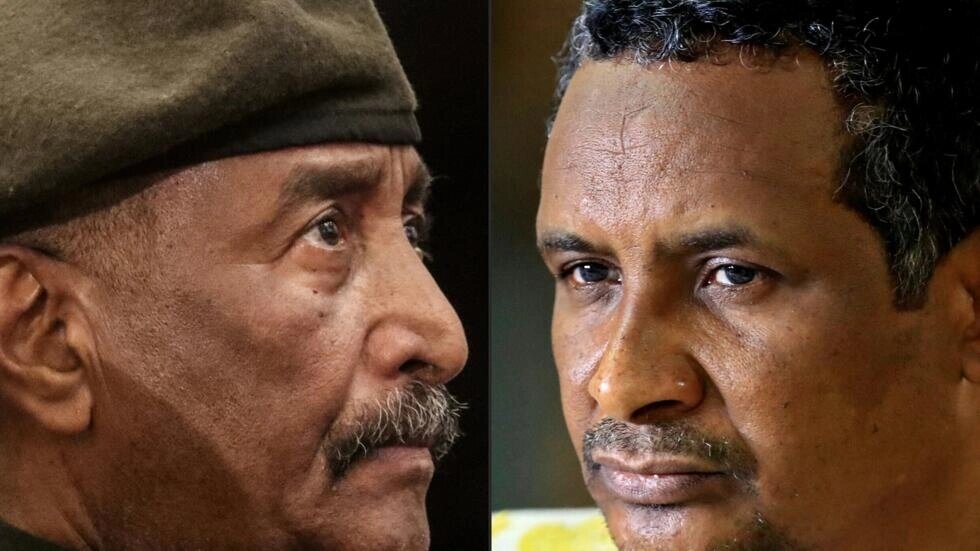Tensions between Sudan’s two most powerful generals had been building for a few weeks before they turned into a full-blown fight on Saturday.
General Abdel-Fattah Burhan, who is in charge of the armed forces, and General Mohammed Hamdan Dagalo, who is in charge of the Rapid Support Forces (RSF), are now fighting over a number of problems. This has stopped the process of getting back to the democratic transition.
Before getting into the current situation, it’s important to note that the current problem in the African country has something to do with the years 2019 and 2021.
The Associated Press says that the country is at the crossroads of the Arab world and Africa. In 2019, the military helped to get rid of former president Omar al-Bashir after mostly calm protests.
After overthrowing Bashir, the military ran the resource-rich country for two years while the previous prime minister Abdalla Hamdok and the Sovereign Council, which is made up of both military and civilian people, set up a government.
This was disbanded in October 2021, which led to protests in which more than 150 people were hurt and close to 100 people died.
After General Burhan took over the country with the help of the RSF, talks for a return to the political transition that had been stopped by the coup in October 2021 began at the end of 2022.
WHAT LED TO THE FIGHTING?
The Sudanese troops and the RSF are now at full strength in Khartoum, which shows that fighting could get worse. In the three-day-long fight, more than 200 people have died and more than 1,800 have been hurt.
The fighting started because RSF leader Dagalo wanted the RSF to join the Sudanese troops. There were also tough questions, like who would have more power over fighters and weapons.
The Associated Press said that Dagalo is trying to make himself look like he supports the change and wants democracy to return. This year, he even criticized General Burhan for saying that his military does not want to “give up power.”
According to a story by the Associated Press, Dagalo played a big part in the Darfur conflict of 2003 by cracking down on the Sudan Liberation Army (SLA) and the Justice and Equality Movement (Jem), which said that Sudanese of Arabic origin were oppressing Sudanese of other backgrounds.
Over the weekend, Dagalo started sending troops to the small town of Merowe, which is north of the city. The Associated Press said that Merowe is important because it has a big airport, is in the middle of the country, and has an electric dam on the Nile River downstream.
He also sent more troops around Khartoum without getting permission from Burhan.
At a military base south of Khartoum, fighting broke out, and both sides blame the other for starting it. The fighting in Khartoum and its twin city Omdurman is still going on. Both sides are using heavy weapons, such as armored vehicles and machine guns placed on trucks, in crowded parts of the capital.
The fighting has spread to the key coastal city of Port Sudan on the Red Sea, the eastern regions on the borders with Ethiopia and Eritrea, and the war-torn Darfur region.
WHAT NOW?
There isn’t much hope for an end to the fighting. The US secretary of state, Antony Blinken, the Egyptian president, Abdel Fattah el-Sisi, and his South Sudanese colleague, Salva Kiir, as well as the Organization of Islamic Cooperation (OIC), have all asked all sides to calm down.
It’s not clear if the Islamic holy month of Ramadan and the three-day holiday of Eid al-Fitr will help and give the people of Sudan a break.
FOREIGN POWERS AT PLAY
Russia, the US, and the European Union are all trying to take control of the resource-rich African country. The Encyclopedia Britannica says that Sudan has gold, uranium, chromite, gypsum, mica, marble, and iron ore. It also says that hydroelectric plants in Sudan have a lot of potential to make energy.
When Bashir was in charge, the Russian military group Wager began to move into Sudan. The RSF, which was led by Dagalo, and the Sudanese army, which was led by Burhan, became close with Saudi Arabia and the United Arab Emirates.
The army is in charge of some places with lots of resources, but the RSF is in charge of most of the gold mining areas. But the country, which has more than 46 million people, is one of the poorest emerging countries in the world, and a lot of its people live in poverty.
